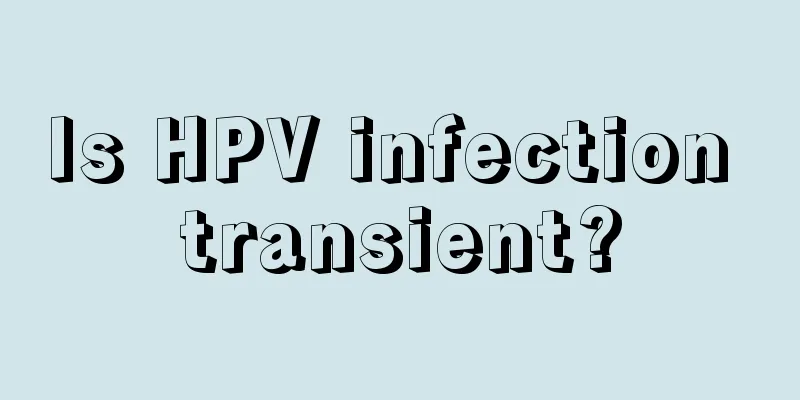Is HPV infection transient?

|
HPV stands for human papillomavirus infection. Different types of HPV infection attack different tissues and locations, including high-risk skin, low-risk skin, and high-risk and low-risk mucous membranes, which can cause different diseases from common warts to cervical cancer. The infection rate in women during their lifetime can reach 60%-70%. Some infections are mainly transient and do not cause disease after infection. The infected person clears the virus based on his or her own immunity. For example, if someone was diagnosed with HPV10 or 13 infection two months ago and had no clinical symptoms, and the current test results show no positive infection, this is a transient infection. Under normal circumstances, HPV (human papillomavirus) is not easy to be infected. As long as you do not have unclean sexual life, you will not be easily infected with HPV. There is no need to worry too much. Just live a normal life. However, if relatives have unclean sexual life, they are very likely to be infected with HPV, which is very harmful to the human body. You need to go to the hospital for examination and treatment as soon as possible. Generally, the symptoms can be controlled through treatment. If the examination is normal, it means that everything is normal and no treatment is needed. HPV is a human papillomavirus infection. HPV has more than a hundred subtypes, that is, it has many subtypes. The understanding of these subtypes can make HPV like a big tree, which has many such subtypes. Or we can understand that there are 56 ethnic groups, there are many Han, Uyghur, and Zhuang nationalities, and HPV has many such subtypes. Among these subtypes, there are generally more than a dozen that can cause threats to the body. Among these dozens of types, the most threatening are the HPV subtypes, HPV16 to 18, which are the most dangerous and most closely related to cervical cancer. There are also some low-risk HPVs, such as perianal diseases, anal diseases, genital warts caused by human papillomavirus infection, and some male genital cancers, vaginal cancers, and private part cancers, which are all related to some low-risk HPV6 and HPV11 infections. Apart from those with stronger harm, we can understand that HPV 16 and 18 are the culprits of HPV infection, 6 and 11 are the culprits in the low-risk group, and other infections are not very harmful, and the human body has a certain resistance to viral infections. Many patients are infected with HPV within 8 months to 2 years. Some patients have a kind of resistance to HPV and can clear it by themselves. Therefore, they are high-risk for HPV. Some patients also have persistent infection and must be taken seriously. Many HPV infections are transient and can be understood as a one-time fever in the vagina, but long-term high-risk persistent infections must be taken seriously because they are closely related to cervical cancer. |
<<: What are the dangers of breast enhancement products?
>>: 8 follicles were obtained from 3 basal follicles
Recommend
What do regular contractions feel like?
Which situation indicates that a pregnant woman i...
Hot search! 2-year-old boy faces amputation, just because he went to the vegetable market? Doctors urgently remind →
Recently, the topic #2-year-old child infected wi...
Is bleeding dangerous during the 15th day of pregnancy?
The 15th day of pregnancy is the early stage of p...
Picture of fetal sac after medical abortion for more than 40 days
After an unexpected pregnancy occurs, if you cann...
Can acupuncture treat gynecological diseases?
Gynecological diseases are a common condition for...
What should women pay attention to when they have pyelonephritis?
The incidence rate of pyelonephritis in women is ...
What causes brain atrophy?
1. Genetic factors: Many studies at home and abro...
Is it OK to eat sweets during menstruation?
Many female friends are very careful about their ...
I got pregnant without going in.
Pregnancy is a complex physiological process that...
How to treat breast hyperplasia?
Nowadays, there are still many hidden dangers to ...
What is pregnancy lower abdominal pain
After pregnancy, there will be one pregnancy reac...
What should I do if I have calluses on my toes?
For women, calluses on toes are a common problem....
The same room smells very bad
Some friends find that there is an unpleasant odo...
Symptoms of nine months of pregnancy
Nine months of pregnancy is approaching the deliv...
How long after induced labor should I check the ultrasound?
When the fetus has developed to 12 weeks, if you ...









